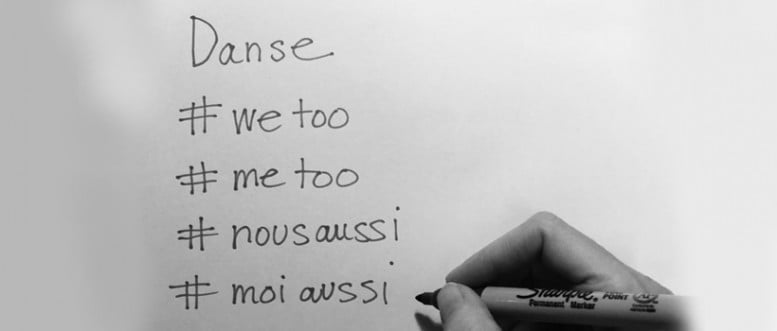Dance #WeToo
Since the emergence of the movement #Metoo last October, several female artists from Quebec have taken to the floor to denounce harassment, intimidation and abuse they have experienced or witnessed during the course of their careers. Few of these testimonies are from the dance community. While all these women are freeing their voices, with solidarity, pride and hope for change and fairness, we continue to whisper, remaining silent while witnessing behaviors and words that we know are unacceptable. Why is it that a community like ours, where 73% of its members are women, are still mute?
Ilse Ghekiere describes in her article #Wetoo: What dancers talk about when they talk about sexism, »being a dancer is not a ‘normal’ job. Our profession is directly linked to our body – a sphere that in most professions is usually considered private. This blurring of the private and the professional is a confusing, problematic and crucial point of tension in our field.”
Our body, object and work tool, makes us vulnerable. This vulnerability can be our strength, but when subjected to abuse, we become silent victims. And unfortunately, these abuses do not get out of our bodies, confining the violence and perpetuating it instead of letting it out and saying loudly #metoo, #wetoo.
Many of us have witnessed transgressions during the course of our careers. Whether it is a reputable doctor in our midst who abuses his power, or a colleague in a position of authority who attempts to transform a strictly professional relationship into a friendly and even an intimate relationship, or a choreographer who appropriates the body and sexuality of the artist, with no concern for their integrity by requiring violent, demeaning and sexist movement and gratuitous nudity. Consent is a mere illusion when ceded through coercion.
It is imperative that we recognize that these types of abusive behaviors are not only cultivated and ingrained in our dance training, but that they have infiltrated the ecology of our environment and continue to affect us all. We specifically learn to respect the code of silence, the pack mentality that demands us to stifle our voices and those of others to maintain our position and to protect our community from prying outsider eyes.
In September, in response to the publication of the text The code of silence by Marie France Forcier, fifteen female performers and choreographers got together to write a letter denouncing the rape culture in our community. When we started inviting colleagues to sign, we realized the extent of the problem: they were sympathetic to the cause and in agreement with the contents of the letter, but only a few dared to sign. The risk of serious professional consequences were too big for the majority.
We can break the silence. The traditions do not have to remain static, we have the power to change things and make our working environment a safe and inspiring space for all.
This is why our group is organizing a panel on sexual abuse in dance on March 1st 2018, in Montreal. Exceptionally, this event is open only to women. Since they are the majority of victims, we want to prioritize their voice this time. Allies will be invited to express their solidarity in subsequent actions. Let’s stand together, break the silence and dare to say #NousAussi, #WeToo.

Geneviève C. Ferron


